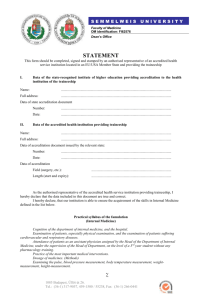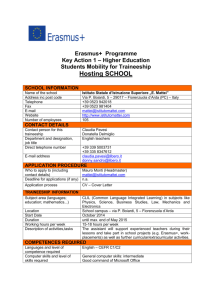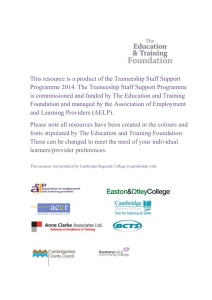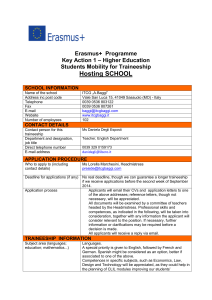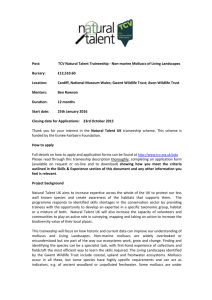1. Workload - Tallinna Tehnikaülikool
advertisement
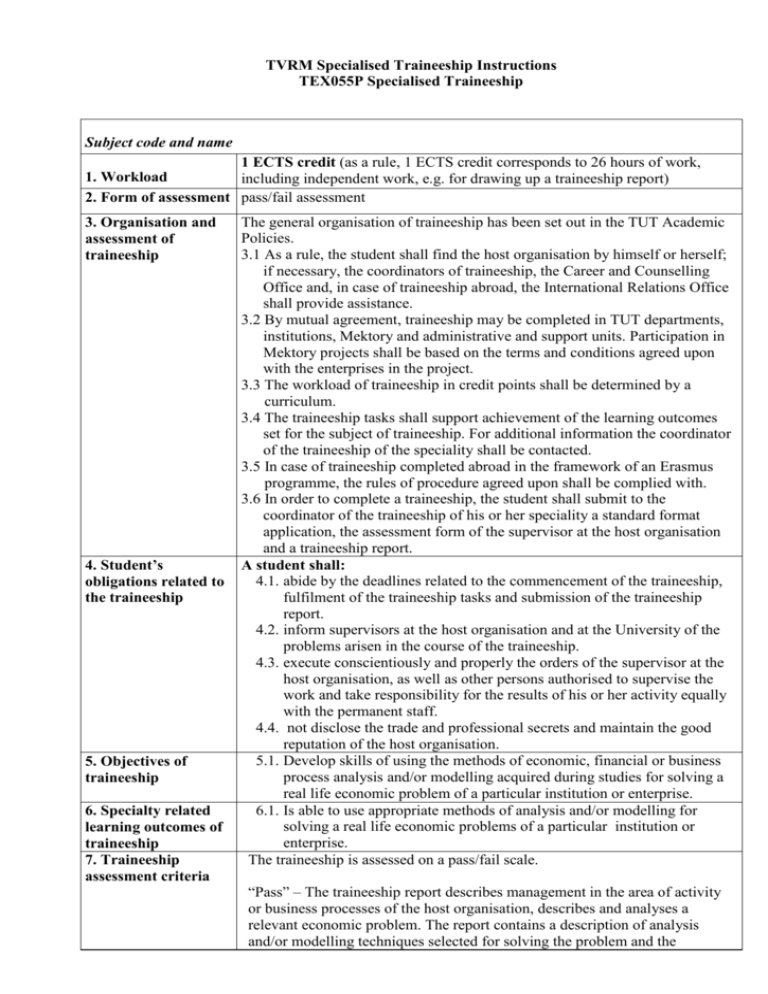
TVRM Specialised Traineeship Instructions TEX055P Specialised Traineeship Subject code and name 1 ECTS credit (as a rule, 1 ECTS credit corresponds to 26 hours of work, 1. Workload including independent work, e.g. for drawing up a traineeship report) 2. Form of assessment pass/fail assessment 3. Organisation and assessment of traineeship 4. Student’s obligations related to the traineeship 5. Objectives of traineeship 6. Specialty related learning outcomes of traineeship 7. Traineeship assessment criteria The general organisation of traineeship has been set out in the TUT Academic Policies. 3.1 As a rule, the student shall find the host organisation by himself or herself; if necessary, the coordinators of traineeship, the Career and Counselling Office and, in case of traineeship abroad, the International Relations Office shall provide assistance. 3.2 By mutual agreement, traineeship may be completed in TUT departments, institutions, Mektory and administrative and support units. Participation in Mektory projects shall be based on the terms and conditions agreed upon with the enterprises in the project. 3.3 The workload of traineeship in credit points shall be determined by a curriculum. 3.4 The traineeship tasks shall support achievement of the learning outcomes set for the subject of traineeship. For additional information the coordinator of the traineeship of the speciality shall be contacted. 3.5 In case of traineeship completed abroad in the framework of an Erasmus programme, the rules of procedure agreed upon shall be complied with. 3.6 In order to complete a traineeship, the student shall submit to the coordinator of the traineeship of his or her speciality a standard format application, the assessment form of the supervisor at the host organisation and a traineeship report. A student shall: 4.1. abide by the deadlines related to the commencement of the traineeship, fulfilment of the traineeship tasks and submission of the traineeship report. 4.2. inform supervisors at the host organisation and at the University of the problems arisen in the course of the traineeship. 4.3. execute conscientiously and properly the orders of the supervisor at the host organisation, as well as other persons authorised to supervise the work and take responsibility for the results of his or her activity equally with the permanent staff. 4.4. not disclose the trade and professional secrets and maintain the good reputation of the host organisation. 5.1. Develop skills of using the methods of economic, financial or business process analysis and/or modelling acquired during studies for solving a real life economic problem of a particular institution or enterprise. 6.1. Is able to use appropriate methods of analysis and/or modelling for solving a real life economic problems of a particular institution or enterprise. The traineeship is assessed on a pass/fail scale. “Pass” – The traineeship report describes management in the area of activity or business processes of the host organisation, describes and analyses a relevant economic problem. The report contains a description of analysis and/or modelling techniques selected for solving the problem and the reasoning for selecting the technique. A summary of works and activities performed by the student in the host organisation have been presented with the assessment of the problem and possible solutions to the problem are suggested. “Fail” – The traineeship report does not reveal the nature of the problem; major shortcomings occur in analysis and/or selection of analysis/modelling techniques; descriptions of the works and activities carried out by the student at the host organisation, assessments and proposals are missing. 8. Traineeship report When drawing up a report, it is recommended to: (the trainee’s analytical 8.1. structure the report pursuant to the requirements specified in clause nine summary of the of these instructions; knowledge and skills 8.2. comply with the requirements of TSEBA formatting acquired during guide for written papers; traineeship and his or 8.3. assess the purposefulness and efficiency of the traineeship; her development) 8.4. provide a self-evaluation; 8.5. provide an overview of the course of the traineeship and analyse fulfilment of the objectives of the traineeship. 9. Structure of 1. Introduction 1.1. Setting objectives and tasks of the traineeship; traineeship report 1.2. The host organisation(s) selected – selection criteria. 2. Analysis of the activity of the host organisation 2.1. Description of the host organisation: field of activity, the main products offered and services provided, number of employees, market position in Estonia and abroad; in case of a large enterprise, focus on activity of the unit or department; 2.2. Description and organisation of the work process; 2.3. Description of the trainee’s work section and main tasks. 3. Overview of the course of the traineeship (incl. self-evaluation) 3.1. Assessment of the preparation: the theoretical and practical level for the completion of the traineeship – strengths and weaknesses; 3.2. Assessment of coping: the list of works and activities carried out in the course of the traineeship and analysis of performance of the assignments; 3.3. Specify what you learnt in the course of the traineeship. Assessment of the new knowledge and skills. 4. Assessment of the host organisation: 4.1. Assessment of the process and course of supervision; 4.2. Suitability of the selected host organisation for fulfilling the objectives of the subject of traineeship. 5. Summary of the traineeship 5.1. Overview of the course and results of the traineeship; 5.2. Assessment of the results of the traineeship and fulfilment of the objectives of the traineeship. 6. Annexes 6.1. Mandatory Annex: Evaluation form of the supervisor at the host organisation. 10.1 If necessary or at the request of the host organisation, a trilateral 10. Traineeship contract for performance of traineeship may be entered into between contract the trainee, the host organisation and the representative of the University (as a rule, University shall be represented by the Head of the Department related to the specialisation). 10.2 As a rule, the host organisation shall enter into a bilateral employment or traineeship contract. 10.3 A decision concerning remuneration to be paid to a trainee shall be made by the host organisation (except in case intellectual property is created).

